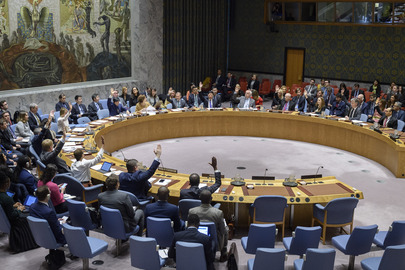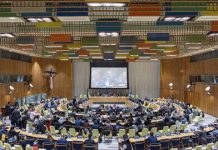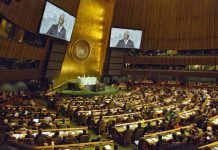Of the 234 million school-age children affected by conflict globally, 85 million children are completely out of school.
The figures are “unprecedented,” Helena Murseli, who leads the UN Children’s Fund’s (UNICEF) Global Education in Emergencies team, told UN News.
UNICEF’s Helena Murseli.
“These are not isolated incidents. They are part of a global pattern of escalating conflict that affects children’s right to learn,” she said.
Childhood without education
In the short and long-term, the consequences of missing out on education during violent crises are severe.
“Education is not just lifesaving, it’s also life-sustaining and life-changing,” Ms. Murseli emphasised.
“When schools close, families also lose their anchor. Children miss the structure, the safety, the normalcy that education provides,” she said. “The day-to-day reality becomes about immediate survival, rather than building a future for them.”
Ms. Murseli stressed that the long-term impacts are just as or even more significant. “Education breaks cycles of conflict and poverty. When entire generations miss school, countries lose the human capital needed for recovery and development. We risk creating what we call a ‘lost generation’—children who grow up knowing only crisis, without the skills or hope to rebuild their society.”
Sudan: The world’s largest education crisis
In terms of numbers, Sudan is the world’s largest education emergency. An estimated 19 million children are out of school, and 90 per cent of schools are closed nationwide due to ongoing violent conflict.
To help address this crisis, Ms. Murseli highlighted that over 2.4 million children have returned to school through more than 850 UNICEF-run Makanna centres – meaning “our space” in Arabic.
UNICEF has also supported over 250,000 children with holistic education services, providing students with water, sanitation, nutrition and protection so they’re able to successfully continue their studies.
The also organization utilises solar-powered tablets for education, “perfect for a country with more than 10 hours of daily sunshine,” said Ms. Murseli.
Children in Kassala, Sudan, study with the help of digital tablets.
Additionally, a $400 million Transitional Educational Plan led by the UN’s education organization (UNESCO) aims to restore access to education and vocational training.
Looking ahead, UNICEF’s education support project in Sudan plans to support relatively stable states with printed materials and remote learning tools.
Systematic destruction of schools in Gaza
The war in Gaza and the destruction of 95 per cent of educational infrastructure has left over 660,000 children out of school – nearly all of Gaza’s school-aged population.
Many former UN-run schools are now being used as shelters for displaced people.
A report to the UN Human Rights Council found that Israeli forces systematically destroyed education infrastructure in Gaza and described these actions as possible war crimes.
Learning with what’s available
According to Ms. Murseli and the UN Palestinian refugee agency (UNRWA) more than 68,000 children in Gaza have been reached through temporary learning spaces offering education and psychosocial support.
UNICEF is also recycling pallets into school furniture and converting supplied boxes into tables and chairs.
In addition, digital tools to study literacy and numeracy lessons have been provided to nearly 300,000 Palestinian refugee children.
Ukraine: education under fire
Within Ukraine, 5.3 million children face barriers to education, and around 115,000 are completely out of school due to the ongoing war.
With many schools on the front lines either closed or operating remotely, over 420,000 children attend school fully online, while 1 million use a hybrid model.
However, ongoing energy shortages have reduced access to online learning to as little as two and a half hours each day, and in-person school is often disrupted by indiscriminate attacks.
In Russian-controlled areas of Ukraine, the UN Human Rights Office said that authorities are enforcing a militarised, patriotic curriculum and banning the Ukrainian language – actions that violate international law, which requires occupying powers to respect children’s national identity and education.
Catch-up classes and safe spaces
UNICEF has established 150 student learning centres in frontline areas and offers twice-weekly catch-up classes in maths and Ukrainian language.
To adapt to the situation on the front lines, Ms. Murseli also highlighted UNICEF’s running of schools in underground metro systems and bomb shelters.
Children study in a shelter in Kharkiv metro in Ukraine.
In 2025, the organization aims to help over 500,000 children across the country access formal education and recreational activities.
To increase safety, UN Ukraine has also launched an initiative to create protected shelters for students and staff during air raids.
The costs of inaction
As crises deepen and humanitarian funding continues to decline, education programmes have faced dramatic cuts.
Ms. Murseli underscored that as humanitarian funding could drop up to 45 per cent by the end of this year, “despite being families’ top priority in emergencies, education receives only 3 per cent of humanitarian aid.”
“I think we are at the critical turning point where we need urgent prioritisation of education and not further cuts,” she said.
Amid rhetoric of a “humanitarian reset” – saving funds by making the humanitarian system more effective – Ms. Murseli emphasised that holistic education programmes that provide students with the humanitarian resources to thrive are the key to withstanding crises and development in the aftermath.
“We’re talking about 234 million children’s future and ultimately, global stability and development. The cost of inaction far exceeds the investment needed to get every crisis-affected child learning,” she concluded.
Source of original article: United Nations (news.un.org). Photo credit: UN. The content of this article does not necessarily reflect the views or opinion of Global Diaspora News (www.globaldiasporanews.com).
To submit your press release: (https://www.globaldiasporanews.com/pr).
To advertise on Global Diaspora News: (www.globaldiasporanews.com/ads).
Sign up to Global Diaspora News newsletter (https://www.globaldiasporanews.com/newsletter/) to start receiving updates and opportunities directly in your email inbox for free.






























